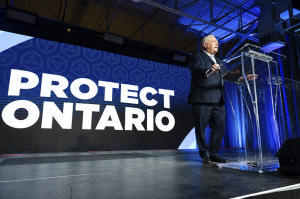Doug Ford reelected as Ontario’s premier with mandate to fight Trump
tariffs
[February 28, 2025]
By JIM MORRIS
VANCOUVER, British Columbia (AP) — Ontario Premier Doug Ford won
reelection to lead Canada’s most populous province on Thursday, giving
him the mandate he wanted to fight tariffs threatened by U.S. President
Donald Trump.
“Donald Trump thinks he can break us,” Ford told a cheering crowd at a
Toronto convention center. “He thinks he can divide and conquer, pit
region against region. Donald Trump doesn’t know what we know.
“Let me be clear. Canada will never, ever be the 51st state. Canada is
not for sale.”
Unofficial results from Elections Ontario showed Ford’s Progressive
Conservative Party would win a majority, giving him his third term as
premier.
Prime Minister Justin Trudeau, whose Liberal Party will choose a new
leader March 9, congratulated Ford on his victory.
“At this crucial time, we must work together to defend Canadian
interests, protect workers and businesses, and grow our economy,”
Trudeau said in a statement.
Ford called the election on Jan. 29, more than a year early. The
Conservatives already held a majority with 79 seats.
At the time, Ford said he needed a four-year mandate to protect Ontario,
Canada’s manufacturing and automobile hub.
Trump has threatened to implement 25% tariffs on all Canadian imports,
with a lower 10% levy on energy, beginning Tuesday. He has also angered
Canadians by talking about Canada becoming the the 51st U.S. state.
During his speech, Ford said during his time as premier he has shown he
will work with anyone to achieve results.

“As we stare down the threat of Donald Trump’s tariffs, I will continue
to do just that,” he said. “I will work with every level of government
and every political stripe. Fighting back against Donald Trump, standing
up for Canada, will take a full Team Ontario effort. It will take a full
Team Canada effort.”
During the campaign Ford made two trips to Washington to speak to U.S.
government and business leaders about the tariffs.
Ford has said his government is prepared to spend “tens of billions of
dollars” to protect jobs and the economy of Ontario, and he has mused
about making Americans pay more for the electricity Ontario sends to the
U.S.
Opposition parties accuse Ford of calling an early election before any
potential charges emerge from a police investigation into his
now-scrapped plan to develop lands under environmental protection.
[to top of second column]
|

Newly re-elected Ontario Premier Doug Ford speaks to supporters at
his election night event in Toronto on Thursday, Feb. 27, 2025.
(Laura Proctor/The Canadian Press via AP)

They also said the cost of the election could have been better spent
on health care and affordable housing.
Jonathan Malloy, a political scientist at Carleton University in
Ottawa, said the tariff threats gave Ford the excuse he needed to
call an early election.
“Canadians are concerned with the Trump tariffs,” Malloy said. “Mr.
Ford is being seen as being out front, responding to them. That’s
politically advantageous for him.”
With a population of around 16 million, Ontario is the Canadian
province with the most people and an economy that makes up 38% of
Canadian GDP.
Unofficial results from Elections Ontario showed the Progressive
Conservatives winning 82 seats, the New Democratic Party 25, the
Liberals 14 and the Greens two, while one seat was won by an
independent.
When the election was called, the NDP had 28 seats, the Liberals had
nine and the Greens had two, with six independents. A majority
government requires at least 63 seats.
The NDP under leader Marit Stiles returned as the official
opposition while Liberal Leader Bonnie Crombie failed to be
reelected.
Stiles said the people had spoken.
“They re-elected the government hoping they would protect them
against tariffs,” she said. “The threat is real.”
During the campaign, Crombie promised to connect every Ontarian to a
family doctor while Stiles addressed health care and affordability.
Green Party Leader Mike Schreiner made promises about building more
housing, protecting farmland and improving affordability.
“I think this had been a very low-profile election,” said Malloy.
“When Canadians are asked about the number one public issue these
days, I’m sure they would say the Trump tariffs. That has
overshadowed the election.”
All contents © copyright 2025 Associated Press. All rights reserved
 |